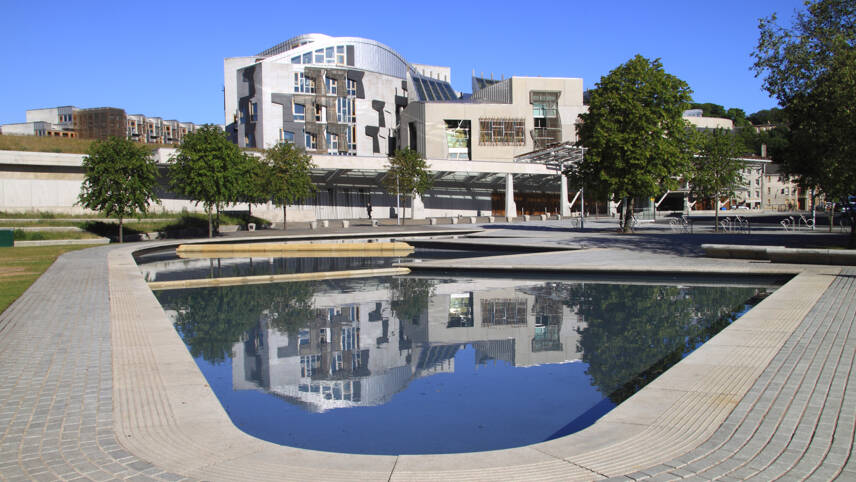Register for free and continue reading
Join our growing army of changemakers and get unlimited access to our premium content

The Scottish Government is working towards a 2045 net-zero target
Posted today (7 June), the Scottish Government’s official greenhouse gas statistics for 2020 confirm that the nation’s net emissions in 2020 were 40 million tonnes of CO21 – a 51% reduction from the 1990 baseline. Net emissions calculations – also known as source emissions – cover all emissions generated domestically and all emissions from international shipping and aviation, minus emissions removals generated domestically through nature-based and man-made solutions.
The statistics also detail calculations made using the Climate Change Committee’s (CCC) emissions accounting and reporting methodology, created with the intention of improving the accuracy of reporting toward the UK’s legally binding net-zero goals. The UK as a whole has a legally binding 2050 net-zero target while Scotland’s devolved target has been set at 2045.
Using the CCC methodology, the report confirms that Scotland’s emissions were 58.7% lower in 2020 than at the baseline period. The CCC’s approach sets a 1990 baseline for CO2, NOx and methane and a 1995 baseline for other significant greenhouse gases.
Scotland’s net-zero law – the Climate Change Act 2019 – specifies that a 56% reduction in emissions within the CCC’s methodology would be needed by 2020 to keep the nation on track to achieve its long-term targets.
While this progress is significant, the Scottish Government has noted that the year-on-year emissions reductions recorded between 2019 and 2020 were, ultimately, what took emissions levels below the limits set out by its targets. These reductions were largely attributable to lockdown restrictions implemented during Covid-19 and were steepest in the transport sector.
Between 2019 and 2020, emissions from car travel fell by 26.6% and a 61.5% reduction was documented in emissions from domestic aviation. Overall, the transport sector’s emissions were down by 20.9%, compared with a reduction of 13% in emissions relating to energy generation and supply.
The SNP’s Net-Zero Secretary Michael Matheson has stated that Scotland “must be prepared for figures to substantially rebound in 2021”, given that lockdown measures were being eased. Similar sentiments have been expressed by MSPs of other parties, and by environmental groups including Stop Climate Chaos Scotland.
Matheson said: “There can be no satisfaction taken in emissions reductions resulting from the health, economic and social harms of the pandemic.
“However, the data does provide a valuable lesson regarding the scale of the transformational change needed in response to the climate emergency and shows that embedding habits such as working from home and using cars less can make a real impact on reducing emissions.”
Stop Climate Chaos Scotland said in a statement that it will continue pushing the Government to “seriously up its game” with plans for long-term and sustainable reductions in emissions from sectors including transport, housing and agriculture.
The organisation’s chair, Mike Robinson, said: “People are rightly worried about food and fuel costs and recovering from Covid-19. With the cost of living crisis largely driven by fossil fuel prices, there are many reasons to deliver against climate targets. Climate action can reduce energy bills, whilst increasing energy security and bringing wider benefits to health and wellbeing. Failure to act will lead to greater uncertainty. The Scottish Government needs to invest fully in delivering against targets short and long term and in a systemic way.”
The CCC’s most recent progress report to the Scottish Parliament on reducing emissions stated that there is still work to be done to ensure decarbonisation policies are “comprehensive” and that delivery is rapid enough to meet forthcoming targets. And, on climate adaptation, the Committee has warned the Scottish Government that its efforts are currently lagging behind its progress on mitigation.
Spotlight on the EU
The news from Scotland comes one week after the EU’s Environment Agency (EEA) submitted official emissions data to the UN ahead of preliminary COP27 scene-setting talks in Bonn.
The preliminary data, included in a report of almost 1,000 pages, states that the EU likely generated 34% fewer net emissions in 2020 than in 1990 – its baseline year for reporting to the Paris Agreement and against its own net-zero ambition.
As was the case with Scotland, the EU has acknowledged that there was a significant year-on-year drop in emissions between 2019 and 2020, largely due to Covid-19 restrictions reducing the demand for transport and slowing down manufacturing. An 11% year-on-year reduction was recorded across the bloc.
The report expresses concern that emissions from these sectors will rebound in 2021. It also details how emissions from air conditioning and refrigeration have climbed in recent years while emissions from building heating have fallen, in a sign of temperature increase.
The EU estimates that its emissions in the second quarter of 2021 were 18% higher than for the same three-month period in 2020.
As such, environmental groups are continuing to push the EU for more delivery on the ground, given that its 2030 climate targets entail a 55% reduction in net emissions against a 1990 baseline. The EU recently published its ‘RePowerEU’ strategy, intended to transition the bloc off of Russian fossil fuel imports by 2027 in a manner that also accelerates energy efficiency improvements, scaling renewable generation and the electrification of heat and transport.


Please login or Register to leave a comment.